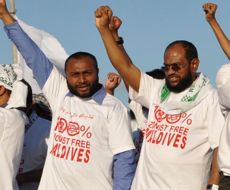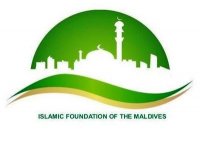Dr Fatemeh Haghighatjoo is a former member of the Sixth Iranian Parliament. A co-founder and chief executive officer of the Nonviolent Initiative for Democracy and a leading advocate for a civil, women’s, and democratic rights in Iran.
During its current session, the UN Human Rights Council has heard the latest report from former Maldivian Foreign Minister and current UN Special Rapporteur on Human Rights for Iran Dr Ahmed Shaheed.
The council is set to consider a resolution to extend Dr Shaheed’s current mandate this Thursday (March 27).
Eight months ago, Iranians overwhelmingly supported the moderate Mr Hassan Rouhani electing him president hoping that he could deliver on his promises to make meaningful human rights reforms. These include the release of political prisoners and prisoners of conscious, and specifically Iran’s most important political opposition leaders – Mir Hossein Mousavi, Mehdi Karroubi and Ms. Zahra Rahnavard – who have been placed under house arrest for three years without charges or even seeing a court.
The international community welcomed Mr Rouhani’s election for many of the same reasons. Yet today, Iran has seen little to no human rights changes. Speech remains strictly curtailed. Hundreds political prisoners languish behind bars. Unfortunately, torture is common while fair trials are rare. Indeed, Iran’s leader and the judiciary have block any prospect of progress.
Facing these internal challenges, the Iranian people need the international community to help prioritise human rights reforms in our country.
The Maldives has played this role in recent years. As one of 47 voting members of the United Nations Human Rights Council it voted to establish and renew a special rapporteur dedicated to monitoring the situation in Iran on three occasions. In fact, the Maldives sponsored these resolutions.
In doing so the Maldives demonstrated why it was elected to the council. It established itself as leading member of the body and one of the few Muslim countries willing to defend human rights.
As a Muslim myself, I know how vital it is that Muslim nations show their commitment to human rights.
This week, I hope Maldives demonstrates its leadership once again when the Iran vote is presented. To do otherwise would be to surrender its responsibilities at the Human Rights Council.
The illegal detention of Mousavi, Karroubi, and Radnvard plays a key role in Iran and demonstrates the need for Maldives and the Council to act.
These three people are no ordinary Iranians. Mousavi is a former Prime Minister of the Islamic Republic and Karroubi, a ranking cleric, is a former speaker of parliament. Both were government-vetted candidates in the disputed 2009 presidential election, and Radnavar – who is Mousavi’s wife – is one of the most respected women’s advocates in Iran and a former chancellor of Alzahra University.
So, if these individuals can be stripped of their rights, held without legal justification, formal charges, or a trial in violation of Iran’s own constitution – anyone can.
After authorities stopped Mousavi, Karroubi, and Radnavar from joining a February 14, 2011 peaceful demonstration in support of the Arab Spring, hardline members of Iran’s parliament called for their deaths on the floor of parliament. For the last three years, the supreme leader has called them traitors and state and pro-government media have repeatedly used distorted religious rhetoric to demonise them.
As a former member of parliament, Mr Karroubi was my boss, a friend and a mentor.
Karroubi is a kind, caring and social person. Human interaction is at the core of his personality. And for three years he has been cut off from the outside world, from visits with others with the rare exception of a few allowed visits from his wife and children. When I was a member of parliament, Karroubi frequently visited with the families of political prisoners and learned of their plight. He advocated on their behalf and in at least two instances, his support for prisoners sentenced to death led to their executions being stayed.
Mousavi and Radnvard were no different – committing themselves in defense of the rights of Iranian people and for this paid the price.
And it isn’t just Mousavi, Karroubi, and Radnvard suffering in Iran. This month, 23 prisoners of conscience wrote an open letter calling for an urgent visit to Iran by international human rights bodies and Dr Ahmed Shaheed, the appointed UN Special Rapporteur on the Situation of Human Rights in Iran, to investigate the systematic violations taking place inside prisons.
As a former member of parliament, I understand the Islamic Republic. I know the only way we’ll see change in Iran is when the world stands with the people of Iran and loudly raises its concern.
The Maldives cannot ignore what is happening in Iran. This week, it must join the Human Rights Council and adopt a resolution renewing the mandate on human rights in Iran. The Maldives should also call for the release of Mousavi, Karroubi, and Rahnavard and other political prisoners and prisoners of conscience in Iran.
For progress to be made, UN member states must stand together and tell Iran’s supreme leader that Iran must improve its dismal human rights record.

